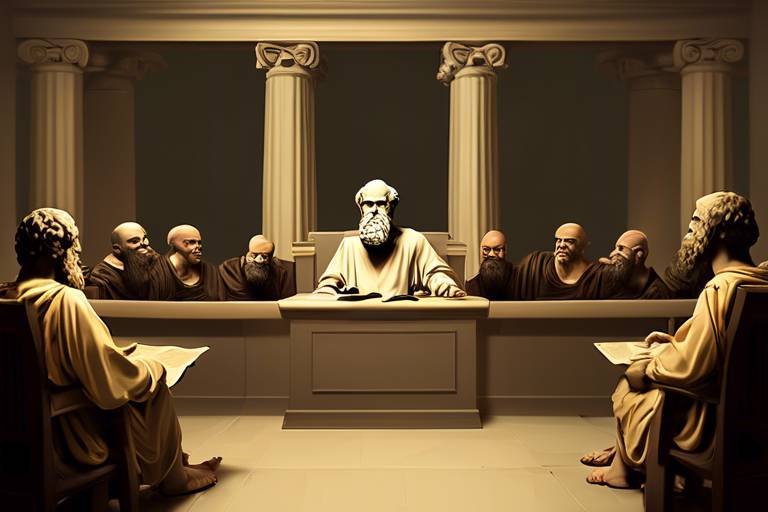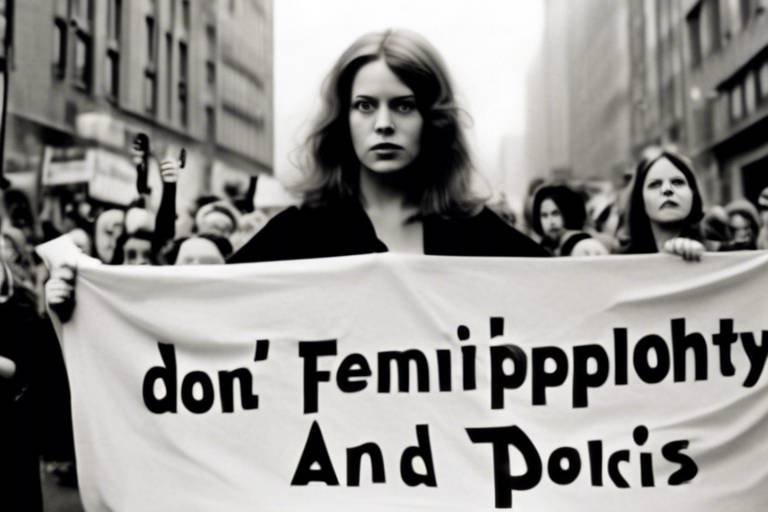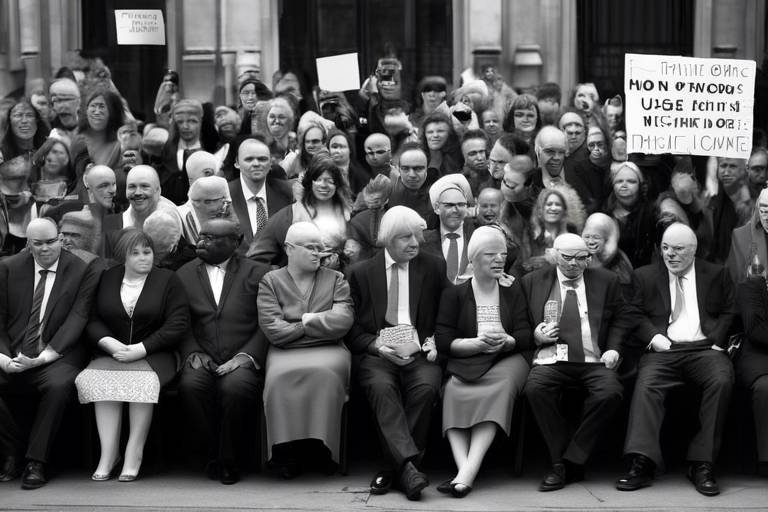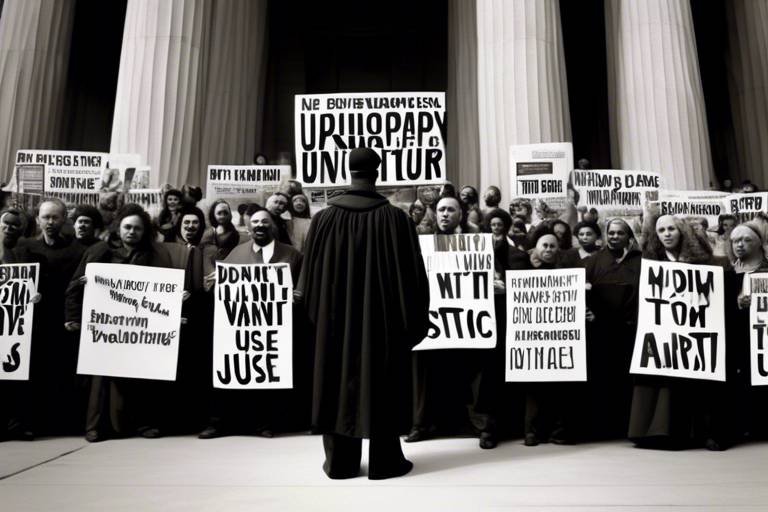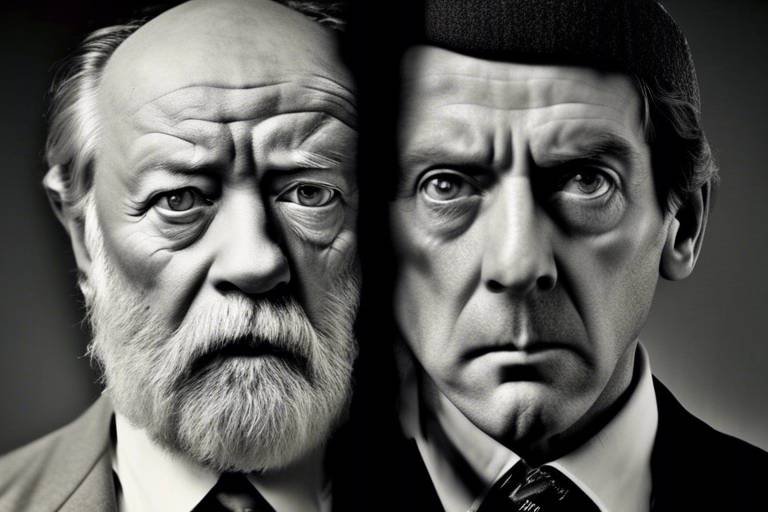Is Politics a Branch of Philosophy?
When we think about politics and philosophy, it's easy to see them as two separate worlds. Politics often feels like a muddy field of partisanship and elections, while philosophy seems to float above it all, pondering the great questions of existence and morality. But what if I told you that these two realms are more intertwined than they appear? The question of whether politics is a branch of philosophy invites us to explore the intricate web of ideas that shape our governance and societal structures. After all, every political ideology, from democracy to authoritarianism, is rooted in a set of philosophical beliefs. So, let’s dive into this fascinating relationship and see how deeply politics is influenced by philosophical thought.
At its core, politics is not just about power struggles or policy-making; it’s about the ideas that underpin those actions. Think about it: when politicians argue for or against a policy, they often invoke philosophical principles, whether they realize it or not. For example, when advocating for social justice, a politician might draw from the philosophical ideas of John Rawls and his theory of justice as fairness. Similarly, discussions about freedom and rights often hark back to the Enlightenment thinkers like Locke and Rousseau. This blending of philosophy and politics raises an intriguing question: can we truly separate the two?
Moreover, the implications of viewing politics as a branch of philosophy extend beyond academic debates. It affects how we engage with political issues in our daily lives. If we acknowledge that our political beliefs are rooted in philosophical ideas, we can better understand the motivations behind various political movements and policies. This understanding can empower us to engage more critically with the political landscape, encouraging a more informed citizenry. In essence, recognizing the philosophical underpinnings of politics can transform how we perceive and interact with governance.
In this exploration, we’ll uncover the historical contexts that bind politics and philosophy together, examine the contributions of key thinkers, and analyze contemporary political theories through a philosophical lens. By the end, we hope to answer the question: is politics merely a branch of philosophy, or is it a reflection of our deepest philosophical convictions? Join us as we embark on this intellectual journey!
- What is the relationship between politics and philosophy? Politics is deeply intertwined with philosophy as political ideologies often stem from philosophical beliefs about human nature, ethics, and governance.
- Can political theories be considered philosophical? Yes, political theories often reflect philosophical ideas, making them a significant aspect of philosophical discourse.
- How do historical figures influence modern politics? Historical figures like Plato, Aristotle, Hobbes, and Rousseau laid the groundwork for contemporary political thought, influencing modern ideologies and practices.
- Why is it important to understand the philosophical basis of political decisions? Understanding the philosophical foundations of political decisions helps citizens engage critically with policies and promotes informed discussions about governance.

The Intersection of Politics and Philosophy
Politics and philosophy have been intertwined since the dawn of civilization, creating a rich tapestry of thought that influences how we govern ourselves and understand our place in the world. At its core, politics is about making decisions that affect groups of people, while philosophy seeks to understand fundamental truths about existence, knowledge, and ethics. This intersection raises a vital question: can we truly separate political ideologies from philosophical principles?
Throughout history, political ideologies have been shaped by philosophical concepts. For instance, the notion of justice is not merely a political term; it is deeply rooted in philosophical inquiry. Thinkers like Plato and Aristotle laid foundational ideas that continue to influence modern political thought. Their inquiries into the nature of justice, the role of the state, and the responsibilities of citizens are not just academic exercises; they are practical considerations that inform how we structure our societies today.
Moreover, the historical context in which these ideas developed cannot be overlooked. During times of upheaval, such as the Enlightenment or the Industrial Revolution, philosophical debates around liberty, equality, and governance were crucial. These discussions did not occur in a vacuum; they were responses to the political realities of their time. As philosophers grappled with the implications of their ideas, they inevitably impacted the political landscape, leading to movements and revolutions that sought to embody these principles in practice.
As we look at contemporary politics, the influence of philosophy remains evident. Modern political theories—such as liberalism, conservatism, and socialism—are not just political platforms; they are grounded in philosophical thought. Each theory presents a unique perspective on human nature, society, and the role of government, often rooted in ethical considerations about how we ought to live together. For instance, liberalism emphasizes individual rights and freedoms, while conservatism often prioritizes tradition and social stability. Understanding these philosophical underpinnings can help us navigate the complexities of modern political discourse.
In summary, the intersection of politics and philosophy is not merely an academic curiosity; it is a dynamic relationship that shapes our understanding of governance and societal organization. By examining how philosophical ideas influence political ideologies, we can gain valuable insights into the challenges and opportunities that lie ahead in our political landscape.
- How do philosophical ideas influence political decisions? Philosophical ideas provide the foundational principles that guide political decisions, shaping ideologies and influencing policy-making.
- Can politics exist without philosophy? While politics can operate on a practical level, it often lacks depth and ethical grounding without philosophical inquiry.
- What are some key philosophical concepts that impact politics? Concepts such as justice, rights, freedom, and equality are central to both philosophy and political theory.

Historical Perspectives on Political Philosophy
The realm of political philosophy is as rich and varied as the societies it seeks to understand. Historically, it has been shaped by a myriad of thinkers, each contributing unique perspectives that reflect the complexities of their times. From ancient Greece to the modern era, political philosophy has evolved, intertwining with the societal and cultural contexts of its day. This evolution not only highlights the significance of political thought but also reveals how deeply it is embedded in our collective consciousness.
In ancient times, philosophers like Plato and Aristotle laid the groundwork for political theory. Plato, in his seminal work, "The Republic," envisioned a society governed by philosopher-kings, where justice and virtue were paramount. His ideas were revolutionary, challenging the status quo and proposing that philosophical wisdom should guide political decisions. In contrast, Aristotle took a more pragmatic approach, emphasizing the importance of ethics and virtue in governance. He believed that the best political system is one that promotes the common good, a concept that resonates even today.
Moving forward in history, the Renaissance and Enlightenment periods sparked a renewed interest in political philosophy, leading to the emergence of modern thinkers like Thomas Hobbes, John Locke, and Jean-Jacques Rousseau. Hobbes, with his work "Leviathan," argued for a strong central authority to prevent chaos and ensure social order. His perspective on human nature was rather bleak, suggesting that without such authority, life would be "solitary, poor, nasty, brutish, and short." In contrast, Locke's theories emphasized individual rights and the social contract, laying the foundation for liberal democracy. Rousseau, on the other hand, introduced the idea of the "general will," advocating for a collective approach to governance that prioritizes the common interest over individual desires.
These historical perspectives are not merely academic; they have profound implications for contemporary political discourse. The debates surrounding liberalism, conservatism, and socialism today can trace their roots back to these foundational thinkers. For instance, the tension between individual rights and collective responsibility can be seen in the ongoing discussions about the role of government in regulating the economy and ensuring social justice. Each political ideology draws from or reacts against these historical foundations, making the study of political philosophy essential for understanding current events.
To illustrate the evolution of political philosophy, we can look at the following table that summarizes key figures and their contributions:
| Philosopher | Key Work | Main Ideas |
|---|---|---|
| Plato | The Republic | Philosopher-kings, justice, virtue |
| Aristotle | Politics | Ethics, virtue, common good |
| Thomas Hobbes | Leviathan | Social contract, strong authority |
| John Locke | Two Treatises of Government | Individual rights, government by consent |
| Jean-Jacques Rousseau | The Social Contract | General will, collective governance |
As we reflect on these historical perspectives, it becomes evident that the interplay between politics and philosophy is not merely academic; it is a living dialogue that continues to shape our understanding of governance and society. The insights gained from these thinkers provide a framework through which we can analyze current political issues, making their contributions timeless and relevant.
- What is political philosophy? Political philosophy is the study of fundamental questions about government, justice, rights, and the role of individuals within society.
- Who are the key figures in political philosophy? Key figures include Plato, Aristotle, Hobbes, Locke, and Rousseau, among others, each contributing unique ideas that have shaped political thought.
- How does political philosophy influence modern politics? Political philosophy provides the theoretical framework for contemporary political ideologies and debates, guiding discussions on governance, rights, and justice.

Plato and the Ideal State
When we think about Plato, the first thing that comes to mind is his vision of the ideal state. In his seminal work, The Republic, Plato outlines a society governed by philosopher-kings, individuals who possess both wisdom and virtue. But what does this really mean for politics? Plato believed that only those who truly understand justice and the good should hold power. This idea was revolutionary for his time and laid the groundwork for future political thought. His concept of the ideal state wasn't just a theoretical exercise; it was a call to action, urging society to strive for a governance model that prioritizes the common good over individual interests.
In Plato's ideal state, society is structured into three distinct classes: the rulers, the auxiliaries, and the producers. Each class has its own role, and their harmonious interaction is essential for a just society. The rulers, or philosopher-kings, are tasked with making decisions that align with the greater good. The auxiliaries serve as the warriors, protecting the state and enforcing the laws, while the producers are responsible for the economic sustenance of the community. This division of labor is not just practical; it reflects Plato’s belief that individuals should excel in the roles for which they are best suited, much like a well-tuned orchestra where each instrument plays its part to create a beautiful symphony.
Plato’s vision also introduces the concept of the “noble lie”, a myth or untruth that is propagated by the elite to maintain social harmony. This notion raises profound ethical questions: Is it acceptable for leaders to deceive the populace if it serves a greater purpose? This dilemma is still relevant today, as we grapple with the transparency and accountability of our political leaders. Moreover, Plato's ideal state emphasizes the importance of education and the cultivation of virtue among citizens, suggesting that a well-informed populace is crucial for the health of the state. He believed that through education, individuals could be guided towards understanding the Forms, especially the Form of the Good, which is the ultimate truth and the foundation of all knowledge.
In conclusion, Plato's ideal state is not merely a blueprint for governance; it's a profound philosophical inquiry into the nature of justice, knowledge, and the role of individuals within society. His ideas challenge us to reflect on our own political systems and consider whether they truly serve the common good. Are we, as citizens, participating in a system that values wisdom and virtue, or are we merely spectators in a chaotic arena of power struggles? The questions Plato raises continue to resonate, inviting us to explore the relationship between philosophy and politics in our quest for a better society.
- What is the main idea of Plato's ideal state? Plato's ideal state is governed by philosopher-kings who understand justice and the common good, emphasizing the importance of wisdom in leadership.
- How does Plato's concept of the noble lie apply today? The noble lie raises ethical questions about the transparency of political leaders and whether deception can be justified for the sake of social harmony.
- Why is education important in Plato's ideal state? Education is crucial as it cultivates virtue and knowledge among citizens, enabling them to contribute positively to society.
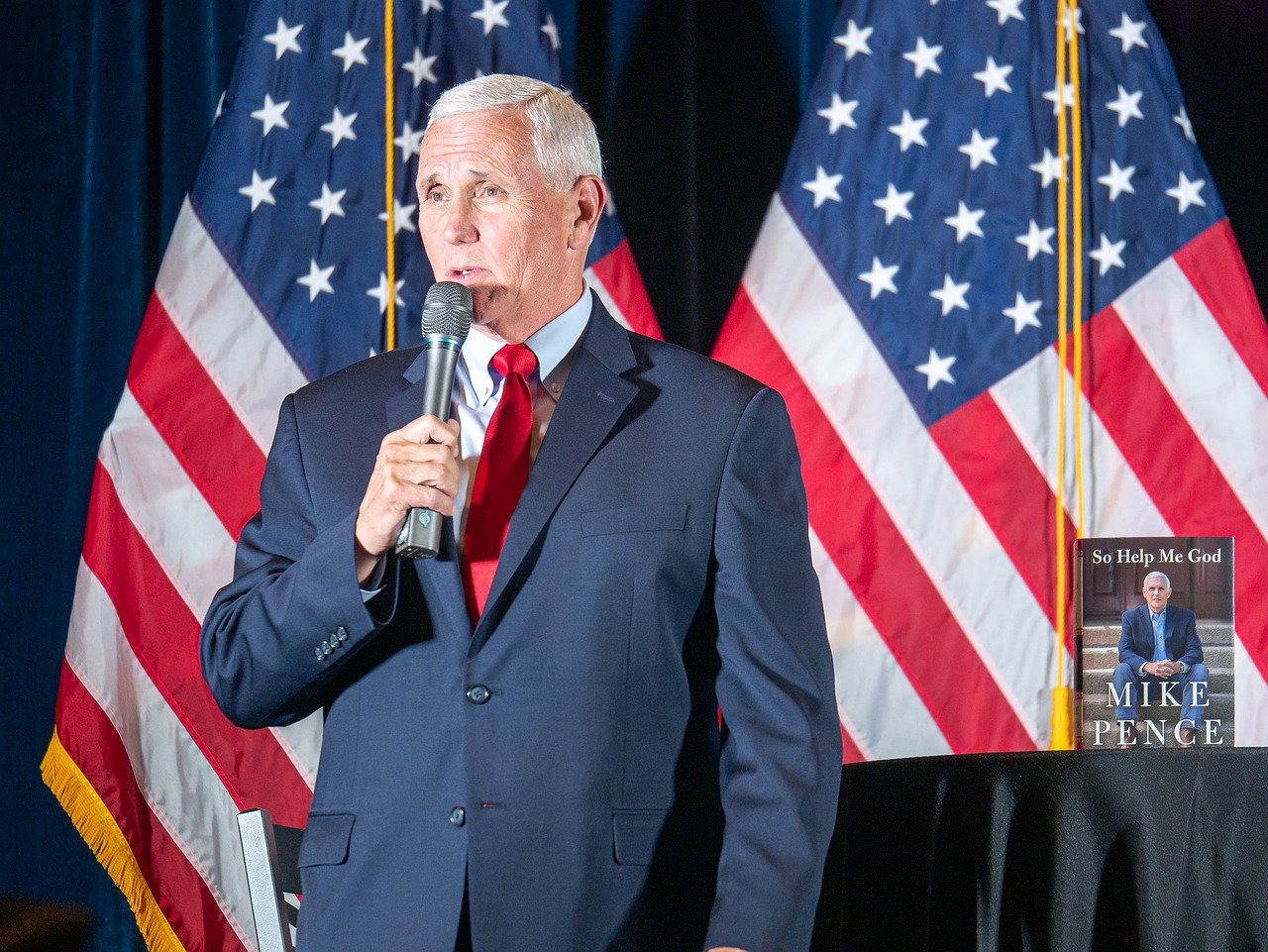
Aristotle's Practical Politics
Aristotle, often hailed as the father of political science, approached politics with a lens of practicality that was both refreshing and revolutionary for his time. Unlike his mentor Plato, who envisioned an ideal state governed by philosopher-kings, Aristotle focused on the realities of human behavior and the complexities of societal governance. He believed that politics should be grounded in the actual experiences of citizens rather than in abstract ideals. This pragmatic approach allows for a more nuanced understanding of how societies function and how individuals can coexist within them.
At the core of Aristotle's political philosophy is the concept of the polis, or city-state, which he regarded as the highest form of human community. He argued that humans are naturally social beings, and thus, the polis is essential for achieving a good life. Aristotle famously stated, “Man is by nature a political animal,” emphasizing that our very essence is tied to our ability to engage in political life. This assertion leads to a critical inquiry: what does it mean to live well in a community? Aristotle believed that the answer lies in the pursuit of virtue and the common good.
Aristotle categorized governments into three ideal forms: monarchy, aristocracy, and polity, each of which can devolve into its corrupt counterpart: tyranny, oligarchy, and democracy. He posited that the best government is one that balances the interests of the rich and the poor, ensuring that no single group dominates. This idea resonates with contemporary discussions about political representation and the need for inclusive governance. Aristotle’s insights remind us that a healthy political system requires a careful balance of power and responsibility.
Moreover, Aristotle emphasized the importance of ethics in politics. He believed that political leaders must possess virtues such as wisdom, courage, and justice to govern effectively. The ethical dimensions of leadership are crucial; leaders should not only aim for the welfare of their constituents but also embody the virtues they wish to instill in society. In this sense, Aristotle's practical politics serves as a guide for contemporary leaders, urging them to consider their moral responsibilities and the long-term implications of their decisions.
In summary, Aristotle’s practical politics is a profound exploration of how ethical considerations and human nature intersect within the realm of governance. His emphasis on the polis, the role of virtue, and the need for balance in political systems provides a framework that remains relevant today. Understanding these principles can help modern societies navigate the complexities of political life, fostering environments where citizens can thrive together.
- What is Aristotle's view on democracy? Aristotle viewed democracy as a potential form of government that could lead to chaos if not balanced with the interests of the wealthy. He believed in a mixed government that incorporates elements of democracy and aristocracy.
- How does Aristotle's concept of virtue apply to modern politics? Aristotle's emphasis on virtue suggests that political leaders today should prioritize ethical decision-making and strive to embody the values they promote within their communities.
- Why is Aristotle considered the father of political science? Aristotle is often referred to as the father of political science due to his systematic approach to studying political systems, governance, and human behavior, laying the groundwork for future political thought.

Modern Political Philosophy
Modern political philosophy marks a significant shift from the classical ideas of ancient philosophers like Plato and Aristotle. It emerges during the Renaissance and Enlightenment periods, a time when thinkers began to question traditional authority and explore concepts of individual rights, freedom, and democracy. This era gave birth to some of the most influential political theorists, including Thomas Hobbes, John Locke, and Jean-Jacques Rousseau. Each of these thinkers contributed unique perspectives that have shaped contemporary political discourse and continue to influence our understanding of governance today.
At the heart of Hobbes' philosophy is the notion of the social contract, articulated in his seminal work, Leviathan. Hobbes posited that in a state of nature, life would be "solitary, poor, nasty, brutish, and short." To escape this chaos, individuals collectively agree to surrender some of their freedoms to a sovereign authority, thus ensuring their safety and order. This idea of a powerful central authority is a cornerstone of modern political thought, raising questions about the balance between state control and individual liberty.
In contrast, John Locke introduced a more optimistic view of human nature and governance. Locke believed that individuals possess natural rights to life, liberty, and property, which the government must protect. His ideas laid the groundwork for liberal democracy and significantly influenced the American and French revolutions. Locke's assertion that government derives its legitimacy from the consent of the governed has become a fundamental principle in modern democratic societies.
Rousseau further challenged the existing political paradigms by emphasizing the importance of the general will and popular sovereignty. In his work The Social Contract, Rousseau argued that legitimate political authority rests on the collective will of the people, which should guide the governance of society. His ideas about participatory democracy and civic engagement resonate deeply in contemporary discussions about political representation and accountability.
The evolution of modern political philosophy did not stop with these thinkers. The 19th and 20th centuries saw the rise of various political ideologies, including liberalism, socialism, and conservatism, each drawing from or reacting against these foundational ideas. For instance, Karl Marx critiqued the capitalist system, arguing that it perpetuates inequality and class struggle, thus advocating for a revolutionary change to establish a classless society. In contrast, contemporary conservatives often emphasize the importance of tradition, social order, and gradual change, reflecting a different interpretation of human nature and society.
Today, modern political philosophy continues to evolve, addressing pressing global issues such as climate change, globalization, and human rights. The debates surrounding these topics often reflect the foundational questions posed by earlier philosophers about the role of the individual within society and the responsibilities of the state. As we navigate these complex issues, the insights from modern political philosophy remain vital, offering frameworks that help us understand and critique our political systems.
- What is modern political philosophy?
Modern political philosophy refers to the body of thought that emerged from the Renaissance and Enlightenment periods, focusing on individual rights, democracy, and the role of government. - Who are the key figures in modern political philosophy?
Key figures include Thomas Hobbes, John Locke, and Jean-Jacques Rousseau, each contributing unique perspectives that have significantly influenced contemporary political thought. - How does modern political philosophy impact today's political systems?
Modern political philosophy provides essential frameworks for understanding governance, individual rights, and the responsibilities of the state, impacting how contemporary political systems are structured and function.

Contemporary Political Theories
In today's fast-paced world, the landscape of political thought is as dynamic as ever. Contemporary political theories reflect the complexities and nuances of our global society, shaped by historical contexts and the ever-evolving nature of human interaction. At the heart of these theories are the fundamental questions: What is justice? How should power be distributed? And, importantly, what role does the individual play within the larger societal framework? These inquiries are not just academic; they resonate deeply in our daily lives, influencing everything from governmental policies to grassroots movements.
Among the most prominent contemporary political theories are liberalism, conservatism, and socialism. Each of these ideologies offers a unique lens through which to view the world, shaped by different philosophical underpinnings and historical experiences. For instance, liberalism emphasizes individual rights and freedoms, advocating for a government that protects these liberties while promoting equality and justice. This theory has its roots in Enlightenment thinkers like John Locke and is characterized by a belief in progress and the potential for human improvement.
On the other hand, conservatism champions tradition, social stability, and a cautious approach to change. It argues for the importance of established institutions and values, often viewing rapid change as a potential threat to societal cohesion. This perspective can be traced back to figures like Edmund Burke, who stressed the importance of historical context and the wisdom embedded in long-standing practices.
Socialism, meanwhile, presents a counter-narrative to both liberalism and conservatism. It advocates for collective ownership and the redistribution of wealth, aiming to address inequalities and provide for the common good. The roots of socialism can be found in the works of Karl Marx and Friedrich Engels, who critiqued the capitalist system and envisioned a society where resources are shared more equitably.
To further illustrate the distinctions and overlaps among these theories, consider the following table:
| Theory | Core Beliefs | Key Thinkers |
|---|---|---|
| Liberalism | Individual rights, equality, and justice | John Locke, John Stuart Mill |
| Conservatism | Tradition, social stability, gradual change | Edmund Burke, Russell Kirk |
| Socialism | Collective ownership, wealth redistribution | Karl Marx, Friedrich Engels |
These contemporary theories are not just theoretical constructs; they actively shape political discourse and policy decisions around the globe. For example, the rise of populism in various countries can be seen as a reaction against both liberal and conservative establishments, reflecting a growing discontent with traditional political structures. This phenomenon has sparked debates about the future of democracy, governance, and the role of citizens in shaping their societies.
Moreover, contemporary political theories also engage with pressing global issues such as climate change, immigration, and social justice. As society grapples with these challenges, the relevance of these theories becomes even more pronounced. They provide frameworks for understanding the complexities of modern governance and the interconnectedness of global citizens.
In conclusion, contemporary political theories serve as essential tools for navigating the intricacies of today's political landscape. By examining the core beliefs and historical roots of liberalism, conservatism, and socialism, we can better understand the diverse perspectives that shape our world. As we continue to engage with these ideas, we are reminded that politics is not merely about power but also about the values and principles that guide our collective journey.
- What is the main difference between liberalism and conservatism?
Liberalism focuses on individual rights and freedoms, advocating for social progress, while conservatism emphasizes tradition and stability, often resisting rapid change.
- How does socialism differ from capitalism?
Socialism advocates for collective ownership and wealth redistribution, whereas capitalism is based on private ownership and free market principles.
- Can contemporary political theories evolve over time?
Absolutely! Political theories are often influenced by historical events, societal changes, and emerging challenges, leading to their evolution and adaptation.
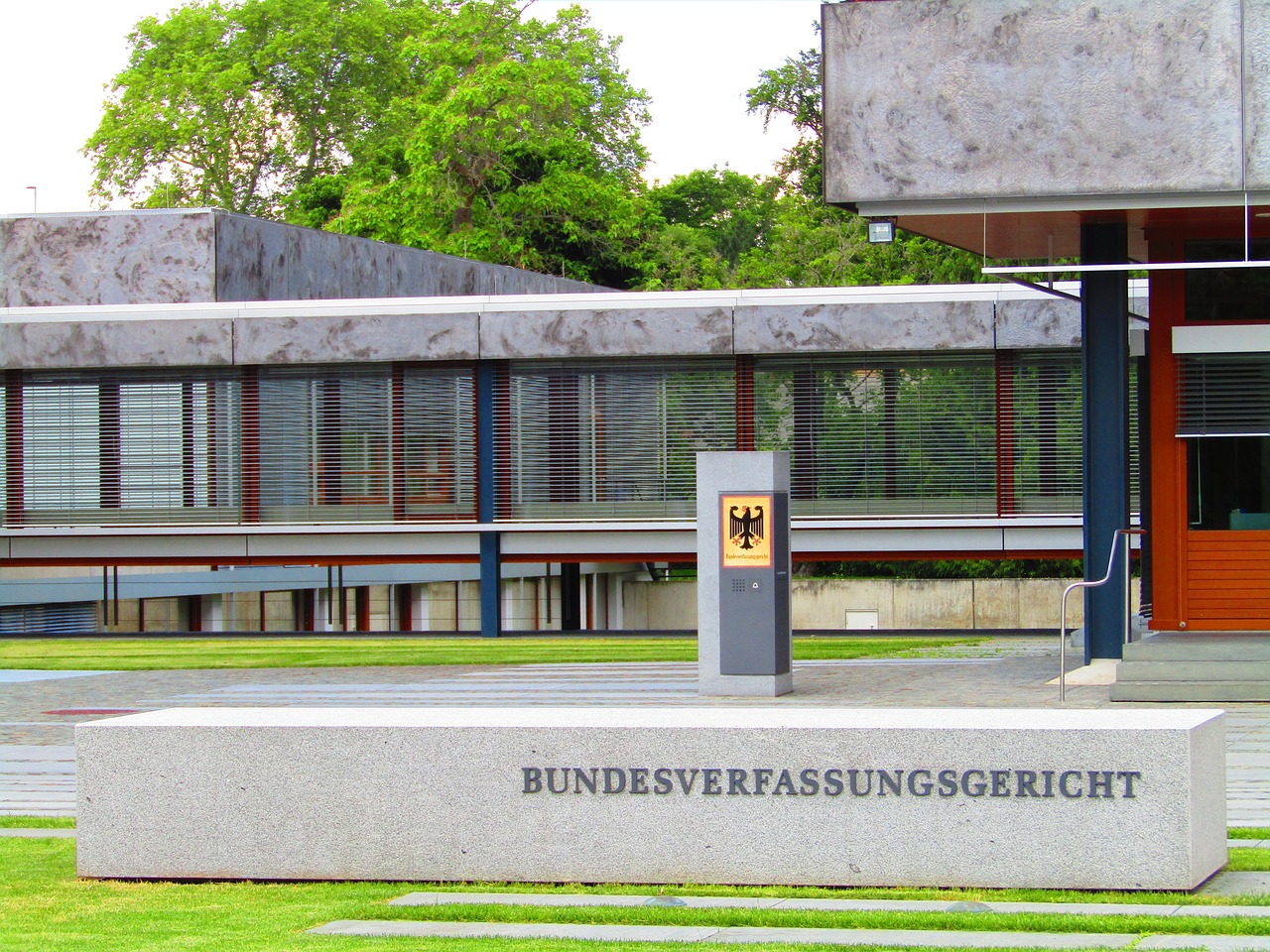
The Role of Ethics in Politics
When we think about politics, what often comes to mind are the debates, the campaigns, and the decisions that shape our societies. But lurking beneath the surface is a vital component that can make or break a political system: ethics. Ethics in politics is like the invisible thread that weaves through the fabric of governance, guiding leaders in their decision-making processes. Have you ever wondered how politicians justify their choices, especially when those choices impact the lives of millions? This is where the complex interplay of moral responsibilities enters the conversation.
Ethics serves as a compass for political leaders, helping them navigate the murky waters of power and influence. In many ways, it is about finding the balance between what is right and what is expedient. For instance, consider the dilemma faced by a politician who must choose between implementing policies that benefit the majority but may harm a minority group. This scenario raises pressing questions: Should the needs of the many outweigh the needs of the few? Or should every individual's rights be preserved at all costs? Such ethical quandaries are not just theoretical; they play out in real-time, shaping the policies that govern our lives.
One of the most significant ethical frameworks influencing political decisions is utilitarianism. This principle suggests that actions are right if they promote happiness or pleasure for the greatest number of people. Imagine a government deciding to allocate resources for a new healthcare system. A utilitarian approach would advocate for the option that maximizes overall health benefits, even if it means cutting funding to less popular programs. However, this raises a critical question: does the end truly justify the means? In practice, utilitarianism can lead to ethical gray areas where individual rights might be compromised for the sake of a perceived greater good.
On the other hand, we have deontological ethics, which focuses on the morality of actions themselves rather than their outcomes. This framework posits that certain actions are inherently right or wrong, regardless of their consequences. For politicians, this means adhering to a set of duties and obligations that guide their conduct. For example, a politician might refuse to engage in deceitful practices during a campaign, prioritizing honesty over winning at any cost. This adherence to duty can foster trust in political institutions, but it also poses challenges when ethical duties conflict with political realities.
Ultimately, the role of ethics in politics is not merely academic; it has profound implications for society at large. When ethical considerations are sidelined, the result can be a loss of public trust and increased cynicism toward political institutions. Conversely, when leaders prioritize ethical decision-making, they can inspire a culture of integrity and accountability. This is essential for a healthy democracy, where citizens feel empowered to engage with their government and hold it accountable.
As we navigate the complex landscape of modern politics, it is crucial to recognize that ethics is not just a theoretical concept; it is a practical necessity. The decisions made by political leaders resonate far beyond the walls of government, impacting the lives of everyday people. Therefore, a commitment to ethical governance is not just desirable; it is imperative for the sustainability of our political systems.
- What is the importance of ethics in politics?
Ethics in politics is crucial as it guides decision-making, fosters public trust, and ensures that leaders are held accountable for their actions. - How do utilitarianism and deontological ethics differ?
Utilitarianism focuses on the outcomes of actions, advocating for the greatest good for the greatest number, while deontological ethics emphasizes the morality of actions themselves, regardless of their consequences. - Can ethical considerations conflict with political expediency?
Yes, there can be significant conflicts between ethical considerations and political expediency, often leading to challenging dilemmas for politicians.

Utilitarianism and Political Decisions
Utilitarianism, a philosophical doctrine primarily associated with thinkers like Jeremy Bentham and John Stuart Mill, serves as a guiding principle for many political decisions today. At its core, utilitarianism posits that the best action is the one that maximizes overall happiness or utility. This principle can be particularly compelling in the political arena, where leaders often face the daunting task of balancing competing interests and needs within society.
When politicians grapple with complex issues, they frequently ask themselves: "Which decision will yield the greatest benefit for the largest number of people?" This question encapsulates the essence of utilitarian thinking. For instance, consider a government deciding whether to allocate funds to healthcare or education. A utilitarian approach would assess which option would produce the most significant overall happiness and well-being for the populace.
However, applying utilitarianism in political decision-making can be a double-edged sword. While it offers a clear framework for evaluating outcomes, it can also lead to moral dilemmas. For example, if a policy benefits the majority but significantly harms a minority, should it be implemented? This is where the tension between utilitarian principles and individual rights comes into play. Politicians must navigate these murky waters carefully, weighing the pros and cons of their decisions.
Utilitarianism's influence can be seen in various political contexts, from public health initiatives to social welfare programs. For example, during a health crisis like a pandemic, governments may prioritize actions that maximize public health even if it means imposing temporary restrictions on personal freedoms. The rationale is that the greater good—saving lives and preventing the healthcare system from being overwhelmed—justifies these measures.
To illustrate the practical implications of utilitarianism in politics, consider the following table that outlines potential scenarios and their corresponding outcomes:
| Scenario | Utilitarian Outcome | Ethical Considerations |
|---|---|---|
| Implementing a new tax for public healthcare | Increased access to healthcare for the majority | Potential financial burden on lower-income families |
| Restricting movement during a health crisis | Reduced spread of disease, saving lives | Loss of personal freedoms and economic impact |
| Funding education programs in underprivileged areas | Long-term societal benefits through improved education | Short-term allocation of resources away from other services |
In conclusion, while utilitarianism provides a robust framework for evaluating political decisions, it is not without its challenges. Politicians must consider both the collective good and the rights of individuals, striving to find a balance that promotes overall welfare without sacrificing essential ethical standards. As we navigate through complex societal issues, the question remains: can we truly achieve the greatest happiness for the greatest number without compromising our moral responsibilities?
- What is utilitarianism? Utilitarianism is a philosophical theory that suggests that the best action is the one that maximizes utility, typically defined as that which produces the greatest well-being of the greatest number of people.
- How does utilitarianism influence political decisions? Politicians often use utilitarian principles to evaluate the potential outcomes of their policies, aiming to choose actions that will benefit the majority of people.
- What are the criticisms of utilitarianism in politics? Critics argue that utilitarianism can overlook individual rights and lead to justifying harmful actions against minorities if those actions benefit the majority.

Deontological Ethics in Governance
When we think about politics, we often picture a chaotic battlefield where decisions are made based on outcomes and popularity. However, deontological ethics offers a refreshing perspective that emphasizes duty and moral obligations over mere results. This ethical framework, rooted in the philosophy of Immanuel Kant, suggests that actions should be judged based on their adherence to rules and principles rather than the consequences they produce. In the realm of governance, this means that politicians and public officials are bound by a moral duty to uphold ethical standards, regardless of the potential fallout from their decisions.
Imagine a politician faced with a tough decision: should they implement a policy that benefits the majority but harms a minority? A deontological approach would argue that the politician has a duty to protect the rights of the minority, even if it means going against the majority's wishes. This principle of respecting individual rights is a cornerstone of deontological ethics and serves as a critical guide for governance. By prioritizing moral duties, politicians can foster a more just and equitable society.
The implications of deontological ethics in governance extend beyond individual decision-making. They influence the very structure of political systems and the laws that govern society. For instance, consider the following table that summarizes key features of deontological ethics in governance:
| Feature | Description |
|---|---|
| Rule-based Decision Making | Decisions are made based on established moral rules, rather than outcomes. |
| Universalizability | Actions should be applicable to all individuals in similar situations. |
| Respect for Persons | Individuals must be treated as ends in themselves, not as means to an end. |
By adhering to these principles, political leaders can cultivate a governance style that not only respects individual rights but also promotes public trust. When citizens perceive their leaders as ethical and principled, they are more likely to engage in the democratic process and support policies that benefit society as a whole. However, the challenge lies in balancing these ethical duties with the practicalities of political life. Often, leaders face pressure to make decisions that yield immediate benefits, which can lead to ethical compromises.
In essence, deontological ethics serves as a compass for politicians, guiding them towards decisions that uphold justice and integrity. It challenges them to reflect on their responsibilities and the moral implications of their actions. As we navigate through complex political landscapes, understanding the significance of duty-based ethics can empower both leaders and citizens to foster a more ethical and accountable governance framework.
- What is deontological ethics? Deontological ethics is a moral philosophy that focuses on adherence to rules and duties rather than the consequences of actions.
- How does deontological ethics apply to governance? It emphasizes the importance of moral obligations for politicians, guiding them to make decisions based on ethical principles.
- Can deontological ethics conflict with political decisions? Yes, there can be tension between ethical duties and political expediency, leading to difficult choices for leaders.
- Why is it important for politicians to adhere to deontological ethics? It fosters trust and integrity in governance, ensuring that individual rights are respected and upheld.
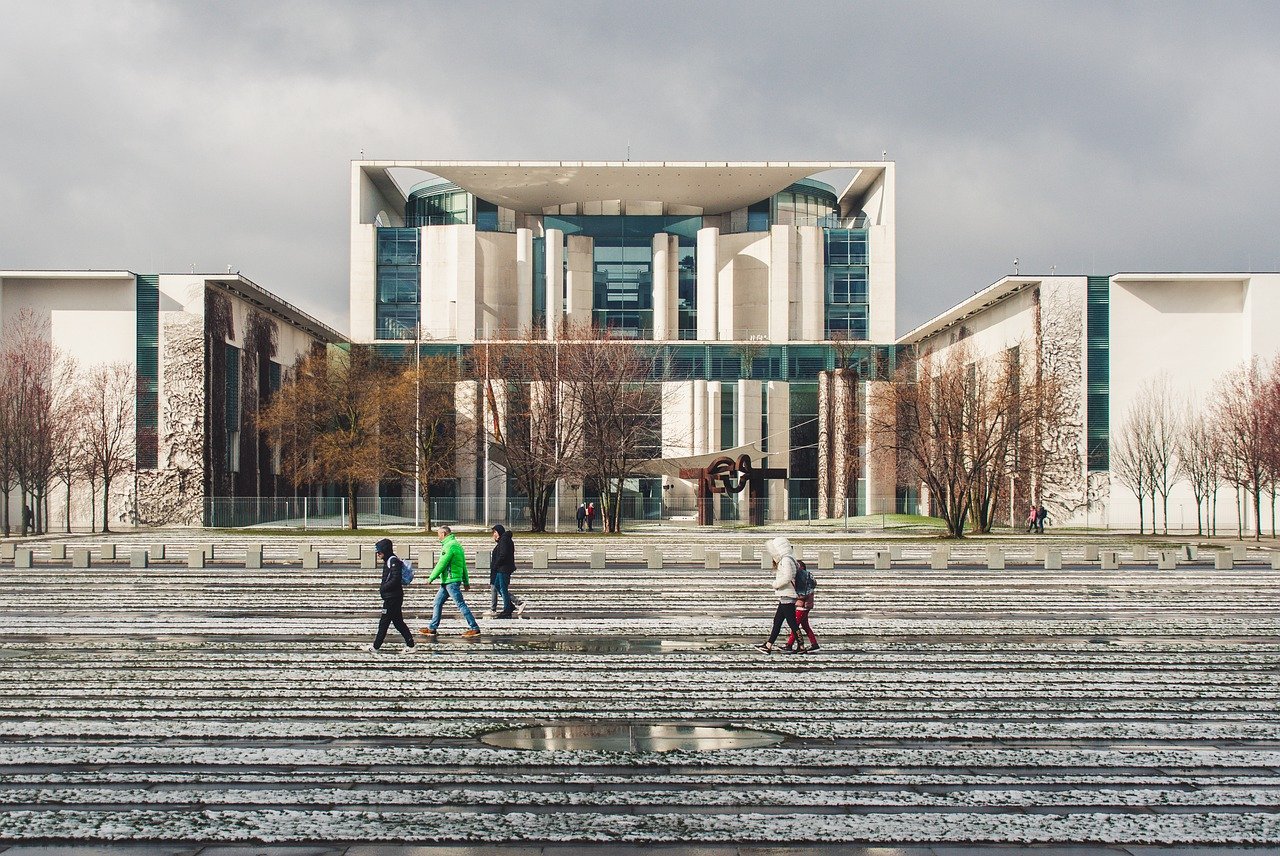
Philosophy's Impact on Political Movements
Throughout history, the interplay between philosophy and political movements has been nothing short of transformative. Philosophical ideas have often acted as the fuel that ignites social change, providing the intellectual framework for movements that seek to challenge the status quo. From the Enlightenment thinkers who championed liberty and equality to modern-day activists advocating for social justice, the influence of philosophical thought is evident in the very fabric of political activism.
Consider the American Revolution, for instance. The founding fathers were heavily inspired by Enlightenment philosophers such as John Locke, whose ideas about natural rights and government by consent laid the groundwork for the Declaration of Independence. Locke argued that individuals possess inherent rights to life, liberty, and property, and that any government must protect these rights. This philosophical underpinning was crucial in rallying the colonists against British rule, illustrating how abstract ideas can lead to concrete action.
Moreover, the civil rights movement in the United States drew heavily from the works of philosophers like Henry David Thoreau and Martin Luther King Jr., who emphasized the moral imperative of justice and equality. King’s famous “I Have a Dream” speech was not just a call for civil rights but a deeply philosophical statement rooted in the belief that all humans are created equal. His approach combined ethical reasoning with a vision of a just society, demonstrating how philosophy can inspire and mobilize people toward a common goal.
In addition, the rise of socialism in the 19th century was profoundly influenced by the writings of philosophers like Karl Marx. Marx's critique of capitalism and his vision for a classless society galvanized workers across Europe and beyond. His ideas provided a theoretical foundation for various political movements aimed at dismantling oppressive structures and advocating for the rights of the proletariat. The impact of Marxist thought can still be seen today in various forms of socialism and leftist politics around the world.
Philosophy doesn't just influence large-scale political movements; it also shapes local activism. For instance, environmental movements often draw from the philosophical principles of deep ecology, which argues for the intrinsic value of all living beings. This perspective has led to a more holistic approach to environmentalism, emphasizing sustainability and the interconnectedness of life. Activists inspired by these philosophical ideas often advocate for policies that protect not just human interests but the planet as a whole.
As we can see, the relationship between philosophy and political movements is not merely academic; it is a dynamic interaction that shapes the course of history. Philosophical ideas can provide the moral compass that guides activists, helping them articulate their goals and strategies. In essence, when people are inspired by profound philosophical concepts, they can mobilize communities, challenge injustices, and ultimately drive societal change.
To sum it up, the impact of philosophy on political movements is profound and multifaceted. It serves as a catalyst for change, offering the intellectual foundation for those who seek to challenge existing norms and advocate for a better world. Whether through the lens of individual rights, social justice, or environmental sustainability, philosophy continues to inspire and empower movements that strive for progress.
- How does philosophy influence political ideologies? Philosophy provides the foundational principles and ethical frameworks that shape political ideologies, guiding how societies understand justice, rights, and governance.
- Can philosophical ideas lead to tangible political change? Yes, many political movements have been inspired by philosophical thought, which often serves as a rallying point for activists seeking to implement change.
- What role do philosophers play in modern political movements? Philosophers can serve as thought leaders, providing critical analyses and ethical guidance that help shape the strategies and goals of political movements.

Conclusion: The Symbiotic Relationship
As we draw our exploration to a close, it's clear that the relationship between politics and philosophy is not just significant; it's profoundly intertwined. Just as a tree relies on both its roots and leaves to thrive, politics and philosophy depend on each other for growth and understanding. Political theories are often grounded in philosophical thought, while philosophical inquiries are frequently prompted by political realities. This symbiotic relationship fosters a deeper comprehension of both fields, allowing us to navigate complex societal issues with greater insight.
Consider the way philosophical concepts such as justice, freedom, and equality shape our political landscape. These ideas are not mere abstract notions; they serve as the bedrock for political ideologies and policies. For instance, the principles of liberalism advocate for individual rights and freedoms, rooted in Enlightenment thought, while socialism emphasizes collective welfare, echoing the philosophical critiques of capitalism. This interplay invites us to question: how can we develop political systems that genuinely reflect our philosophical values?
Moreover, the ethical dimensions of political decision-making highlight another layer of this relationship. Politicians often grapple with moral dilemmas, weighing the consequences of their actions against their philosophical beliefs. The utilitarian approach, which seeks the greatest good for the greatest number, clashes with deontological ethics, which emphasizes duties and rights. This tension not only enriches political discourse but also challenges us to consider the broader implications of our choices on society.
In our rapidly changing world, understanding the philosophical underpinnings of political movements is more crucial than ever. From civil rights to environmental activism, many social movements draw inspiration from philosophical ideas, demonstrating the power of thought in driving change and reform. The capacity of philosophy to inspire action reminds us that ideas can indeed shape reality, prompting us to reflect on how our own beliefs can influence the political landscape.
In conclusion, the intricate dance between politics and philosophy is a testament to their interdependence. By delving deeper into one discipline, we can unlock new insights into the other, fostering a more nuanced understanding of our world. As we navigate the complexities of contemporary political issues, let us not forget the rich philosophical traditions that inform our perspectives and guide our actions.
- How does philosophy influence political ideologies?
Philosophy provides the foundational concepts and ethical frameworks that shape political ideologies, helping to define what is considered just, fair, and ethical in governance. - Can political decisions be purely objective?
While some aspects of political decisions may be based on objective data, ethical considerations and philosophical beliefs often play a significant role in shaping these choices. - What role do ethical theories play in politics?
Ethical theories, such as utilitarianism and deontological ethics, guide politicians in making decisions that affect society, balancing individual rights with the common good. - Are political movements driven by philosophical ideas?
Yes, many political movements are inspired by philosophical concepts, using these ideas as a framework to advocate for social change and reform.
Frequently Asked Questions
- Is politics considered a branch of philosophy?
Politics and philosophy are deeply intertwined. While politics deals with governance and societal structures, philosophy provides the foundational ideas and ethical considerations that shape political theories. Thus, many argue that political thought is indeed a branch of philosophical inquiry.
- How did historical figures influence political philosophy?
Key figures like Plato and Aristotle laid the groundwork for political philosophy. Plato's vision of the ideal state and Aristotle's emphasis on ethics in governance have significantly shaped political theories throughout history, influencing how societies understand justice, governance, and the role of citizens.
- What is the role of ethics in political decision-making?
Ethics plays a crucial role in politics as it guides the moral responsibilities of politicians. Ethical frameworks, such as utilitarianism and deontological ethics, help in evaluating the implications of political decisions on society, ensuring that actions align with moral principles.
- Can you explain the impact of philosophy on political movements?
Philosophical ideas have historically inspired social and political movements. Concepts like liberty, equality, and justice have fueled revolutions and reforms, demonstrating how powerful thoughts can drive societal change and influence collective action.
- What are contemporary political theories based on?
Modern political theories, such as liberalism, conservatism, and socialism, draw heavily from historical philosophical foundations. They reinterpret these ideas to address contemporary issues, reflecting the ongoing dialogue between political practice and philosophical thought.
- How do utilitarianism and deontological ethics differ in politics?
Utilitarianism focuses on the greatest good for the greatest number, often prioritizing collective happiness over individual rights. In contrast, deontological ethics emphasizes duty and moral rules, insisting that certain actions are inherently right or wrong, regardless of their outcomes, shaping political accountability in different ways.


